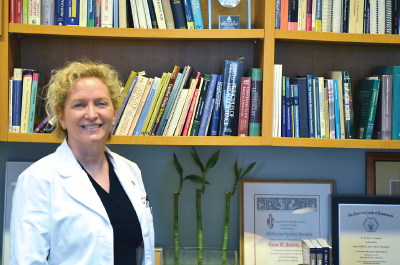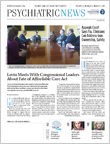At APA’s annual meeting in San Diego, Laura Weiss Roberts, M.D., M.A., will present another iteration of her well-known boot camps for residents, fellows, and early career psychiatrists.
Explorations of leadership, networking skills, self-advocacy, negotiation, and work-life balance will offer attendees professional insights that Roberts has accumulated over the years of her own career.
The boot camps will take place on Saturday, May 20, and Monday, May 22.
Roberts, a professor and chair of psychiatry and behavioral sciences at the Stanford University School of Medicine, has been delivering programs like this for years in her own departments and at the APA and other medical meetings. The seed for such sessions was planted during her first faculty job at the University of New Mexico School of Medicine when, after 30 years of education and training, she suddenly had to write letters of recommendation and wrestle budgets for her clinical unit.
“You can be in school forever and not know what you need to know to be successful as an academic psychiatrist,” she recalled in an interview. “So I sat down and thought about all the things that nobody had ever taught me.”
Much of that hard-earned wisdom is collected in the Handbook of Career Development in Academic Psychiatry and Behavioral Sciences, co-edited with Donald Hilty, M.D., the second edition of which will be published in April by American Psychiatric Association Publishing at www.appi.org. The book and the boot camp fill a niche that is often missing in the usual course of training, said Roberts.
“Last year, there were a lot of chief residents and fellows who seemed hungry for mentoring,” she said. “They were eager to think about their futures in any setting—public, private, or academic.”
She doesn’t give the usual “how-to-be-a-leader” talks, she said.
“I emphasize people’s being reflective on a fundamental sense of their calling,” she said. “What is it they love about being in the academic world? And then we discuss how to take their passion in that area and parlay it into something that others value, too. Leadership is a way of doing what you’re meant to do.”
Roberts tries to dispel the myths and clichȳs about professional success. She noted that she has risen in the academic world with a distinctly nontraditional resume. She does ethics research, is dedicated to education, and has six children.
“I’m the poster child for all the things you’re not supposed to be,” she said.
The interactive sessions will include numerous hypothetical case studies that challenge leaders at every level of psychiatry. The exercises should be valuable to mentors, as well as graduating residents—or even junior residents who are merely thinking about their future, she said.
“My intention is to be as inclusive and welcoming as possible,” she said. “A person might come to this even if they have no intention of being in academia. I don’t want people to think there’s only one way of being an academic psychiatrist or even that there’s only one way to be in the room.” ■
“A Leadership Boot Camp for Residents and Fellows” will be held Saturday, May 20, and “A Leadership Boot Camp for Early-Career Aca-demic Psychiatrists” will be held Monday, May 22. Both sessions will meet from 8 a.m. to 11 a.m. in the San Diego Convention Center in Learning Lab I, Ballroom 20D.

